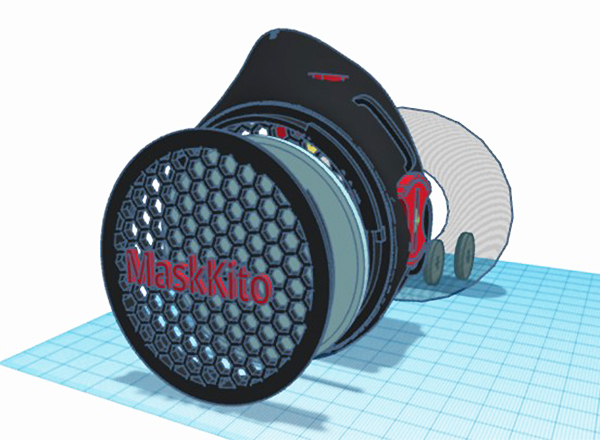HFC to compete in finals of national Community College Innovation Challenge

The National Science Foundation, in partnership with the American Association of Community Colleges, has selected 12 teams – including one from Henry Ford College – to compete in the final round of the Community College Innovation Challenge.
The CCIC seeks to strengthen entrepreneurial thinking among community college students by challenging them to develop innovative solutions to real-world problems. It also enables students to discover and demonstrate their capacity to use STEM to make a difference in the world and to translate that knowledge into action.
HFC has been among the top finalists in the CCIC in 2015, 2016, and 2017. There was no CCIC competition in the 2019-20 academic year.
“For several consecutive years, we placed among the finalists,” said HFC Pre-Engineering Program Director Dr. Hassan Mohseni Nameghi.
MaskKito
The HFC team, comprising students Warren Harrison and Hasan Yahfoufi under the guidance of Nameghi, designed MaskKito (see video below). The main ways to combat the coronavirus pandemic has been social distancing, wearing masks, and getting vaccinated. However, conventional masks are not effective in eliminating viruses. MaskKito is a nano-cleanser mask that has the ability to destroy viruses using nano-fiber weaves technology and UVC radiation.
The primary function of MaskKito is not continuous usage, but as a mask that helps protect people in crowded areas with other people. The secondary function is to work as an emergency unit during actual times of outbreaks or in a medical environment.
“The most exciting benefit of our mask is it exercises safety protocols for long-distance traveling,” said Harrison.
“It provides protection for people if they cannot social distance, such as doctors and other medical personnel in a hospital setting or travelers on a plane, giving them confidence and security,” said Nameghi.
Virtual Innovation Boot Camp
The finalists will attend a Virtual Innovation Boot Camp June 14-17 and will interact with entrepreneurs and experts in business planning, stakeholder engagement, strategic communication, and marketplace dynamics. The Boot Camp culminates in a Student Innovation Showcase with STEM leaders and Congressional stakeholders, as well as a pitch presentation to determine the first, second, and third-place winning teams.
Coaches are assigned to each team to serve as an informal sounding board and to provide guidance/feedback on their communication strategies as they prepare for the Student Innovation Showcase and the Team Pitch Presentation. Kamali Burke, Associate Vice President, of the Fenton Agency – a social change agency based in New York City – has been assigned to the HFC team.
“Throughout this process, entrepreneurial coaches will be on hand to help make this prototype a reality,” said Nameghi.
"It is truly inspiring to see the creativity and amazing talent of students in the nation's community colleges, and I would like to congratulate the finalists for their hard work," said Karen Marrongelle, assistant director for NSF's Education and Human Resources Directorate. "We need to inspire new generations across all communities to explore the wonders of science and engineering, and CCIC is an exciting opportunity for students to start thinking about STEM careers. I look forward to learning more about their projects and the contributions these students will make to America's STEM future."
HFC student innovator Warren Harrison describes the MaskKito and how it works.
President Kavalhuna made a brief video congratulating the finalists and encouraging them to continue their entrepreneurial pursuits.